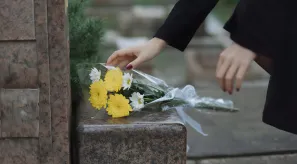When a person dies, customs and traditions change depending on their cultures and religions. The differences between a Catholic and a Buddhist funeral, for example, are numerous and the same is true for an Arab funeral. The concept of death in each religion also determines the rites that are carried out in each case. At Stelae, we will explain the characteristics of Arab funerals in order to better understand their rituals and ceremonies.
Funeral preparations
An Arab funeral is carried out according to the teachings of the Koran and the Sunnah, the tradition of the Prophet Mohammed. In Islam, death is a natural event and a funeral should take place as soon as possible in order to release the soul from the body. As such, the funeral takes place within three days of the time of death.
Furthermore, death is considered to be the beginning of true existence and, therefore, preparations are made in haste to enable the deceased to begin that life.
Arab funeral rites and ceremonies
At an Arab funeral, various solemn funeral rites take place, ranging from the preparation of the deceased, the transfer to the cemetery, the burial, as well as the post-funeral rites and customs.
Preliminary preparation
First of all, the funeral preparations are made, in which the washing and wrapping of the deceased are performed in a very specific manner:
- In accordance with Islamic tradition, the adult members of the family bathe the deceased person for their purification (men do it with men and women do it with women). This is done in a very specific way, with an odd number of washings and a number of steps indicating which part of the body is washed in which order. In the case of a woman, her hair is also tied in three braids behind her back. Finally, they are rubbed with oils or perfumes.
- Once cleaned, the deceased person is then wrapped in a white cloth. It is recommended to use three white cotton cloths for men and five for women.
Once this step is completed, there are usually no more visitors, except for certain members of the community immediately after the deceased is wrapped.
Funeral
An Arab funeral takes place in a mosque in a short and very formal service.
Before entering, attendees leave their shoes at the door. Women and men then sit on the floor in separate areas. All must dress formally, and women must also cover their faces with a veil or scarf and wear loose-fitting, modest clothing.
After the singing and recitation of the Quran, the attendees pay their respects, but any comments they make to the family should be brief and in good taste.
Transfers
When the preliminary preparations for the Arab funeral are completed, the deceased person is transferred for burial. This is usually done in a wooden coffin without a lid, which will not be used in the burial, as will be seen in the next section.
Women do not take part in the funeral procession, as this is associated with the ancient mourners. For Muslims, there is a specific process of 'mourning' which should not last more than three days.
Another important aspect regarding the transfer is that it should not be to another city. Therefore, it is advisable that the person is buried in the city in which they die.
Burial
Under Islamic law, the deceased is placed directly in contact with the earth, without a coffin of any kind, lying on their right side with their face pointing in the direction of Mecca.
During the burial ceremony, the first Surah of the Quran is read and other prayers are performed. At the end, attendees scatter three handfuls of earth on the deceased.
Subsequent rituals
Once the burial has been carried out in the cemetery, the relatives visit the grave of the deceased on certain key days: on the third day, the ninth day and on the fortieth day.
Relatives should speak well of their loved one and pray that, according to their beliefs, the archangel Gabriel may know that their loved one deserves to receive mercy and be saved from hell. In this regard, relatives recite the Quran for three nights in their memory. They can also express their pain but in a moderate way. Women may not extend their pain for more than three days, unless it is their husband they are grieving for. If it is, it may last for four months and ten days.
Another custom, that is also carried out in other types of farewell rituals, is to send flowers to the family after the funeral. However, no flowers are placed on the grave.
The importance of food during the mourning period
Family members and friends usually bring food to the family of the deceased during an Arab funeral so that they do not have to be involved in providing food themselves.
In addition, neighbours offer their homes for the wake and, during this time, provide mourners with a very thick coffee that tastes quite bitter. This gesture is a way of expressing the bitterness felt at the death of a loved one.
The same coffee is also served after the burial, when condolences are expressed to the family. During this time, a traditional type of bread is also eaten.
Therefore, food also has a special meaning at an Arab funeral.



